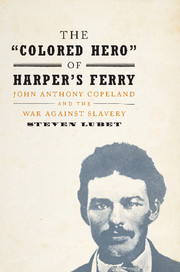Book contents
- Frontmatter
- Dedication
- Contents
- Acknowledgments
- Author's Note
- Prologue
- 1 The Frozen River
- 2 A Good Abolition Convention
- 3 The Colony and the College
- 4 “A Most Well Disposed Boy”
- 5 “I Have Found Paradise”
- 6 “My Object in Coming to Oberlin”
- 7 Not a Fugitive Was Seized
- 8 The New Marshal
- 9 “Recital of the Wrong and Outrage”
- 10 Wack's Tavern
- 11 A Brace of Pistols
- 12 The Oberlin Rescue
- 13 “The Black Mecca”
- 14 The Felons' Feast
- 15 Votaries of the Higher Law
- 16 “The Bravest Negroes”
- 17 The Invisibles
- 18 The War Department
- 19 Hall's Rifle Works
- 20 “His Negro Confession”
- 21 Nothing Like a Fair Trial
- 22 An Abolition Harangue
- 23 Only Slave Stealing
- 24 This Guilty Land
- 25 The Colored American Heroes
- Epilogue
- Notes
- Bibliography
- Index
22 - An Abolition Harangue
Published online by Cambridge University Press: 05 July 2015
- Frontmatter
- Dedication
- Contents
- Acknowledgments
- Author's Note
- Prologue
- 1 The Frozen River
- 2 A Good Abolition Convention
- 3 The Colony and the College
- 4 “A Most Well Disposed Boy”
- 5 “I Have Found Paradise”
- 6 “My Object in Coming to Oberlin”
- 7 Not a Fugitive Was Seized
- 8 The New Marshal
- 9 “Recital of the Wrong and Outrage”
- 10 Wack's Tavern
- 11 A Brace of Pistols
- 12 The Oberlin Rescue
- 13 “The Black Mecca”
- 14 The Felons' Feast
- 15 Votaries of the Higher Law
- 16 “The Bravest Negroes”
- 17 The Invisibles
- 18 The War Department
- 19 Hall's Rifle Works
- 20 “His Negro Confession”
- 21 Nothing Like a Fair Trial
- 22 An Abolition Harangue
- 23 Only Slave Stealing
- 24 This Guilty Land
- 25 The Colored American Heroes
- Epilogue
- Notes
- Bibliography
- Index
Summary
SIX LAWYERS HAD COME AND GONE from John Brown's case by the time attorney George Sennott made his presence known in Charlestown on November 2. Finding the two African-Americans unrepresented, Sennott filed his appearance on behalf of Copeland and Green and began to prepare a startling defense.
Sennott was an outsized character – in terms of height, girth, and personality – whose appearance at first occasioned outright ridicule in Charlestown. The local newspapers took turns deriding him. One reporter sneered that “George Sennott has come to us upon a mission of great bigness, and his size, so far as latitude is concerned, shows him fully up to the immortal standard of envoys extraordinaire.” “When he is out of Boston,” another journalist scoffed, “we presume lager beer has an opportunity to accumulate.” Sennott was indeed a man of large appetites, but he was also an outstanding lawyer. He was an anti-slavery Democrat – an identification that was vanishing in the North and nonexistent in the South – which may have contributed to the scorn he attracted in Charlestown. One courthouse wag opined that Sennott's representation of the black defendants was intended just “to waste time” by a lawyer who was “either a fool, crazy, or drunk.” But never was an insult more misguided.
Sennott had taken a circuitous route to abolitionism. Born in Vermont, he had come to Boston as a young man in order to read law in the office of Rufus Choate, who was widely regarded as the finest trial lawyer in New England. Choate was a consummate professional, meaning that he had broad connections but few fixed principles when it came to clients. He was therefore the lawyer of choice for Boston's merchants and bankers, many of whom owed their wealth to goods produced by slavery.
- Type
- Chapter
- Information
- The 'Colored Hero' of Harper's FerryJohn Anthony Copeland and the War against Slavery, pp. 177 - 181Publisher: Cambridge University PressPrint publication year: 2015



